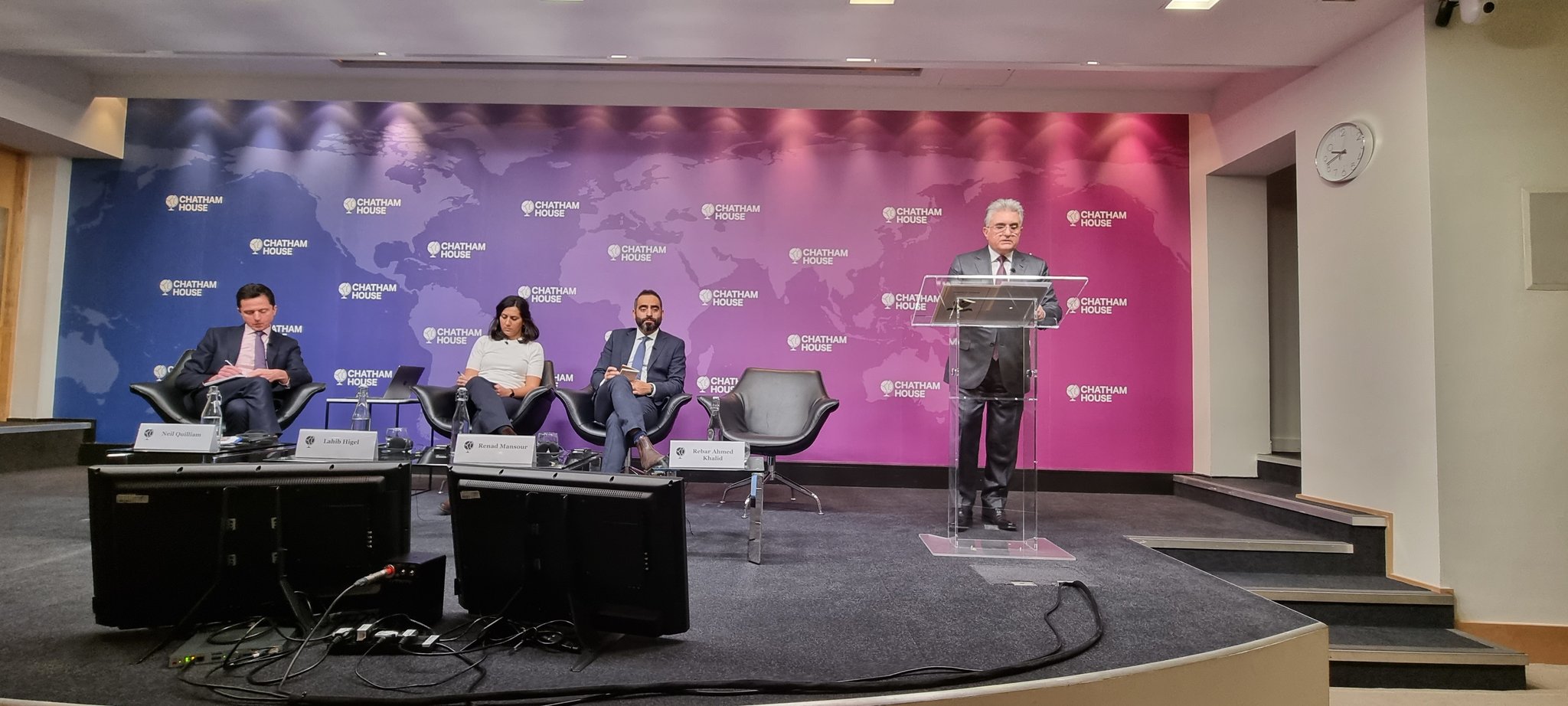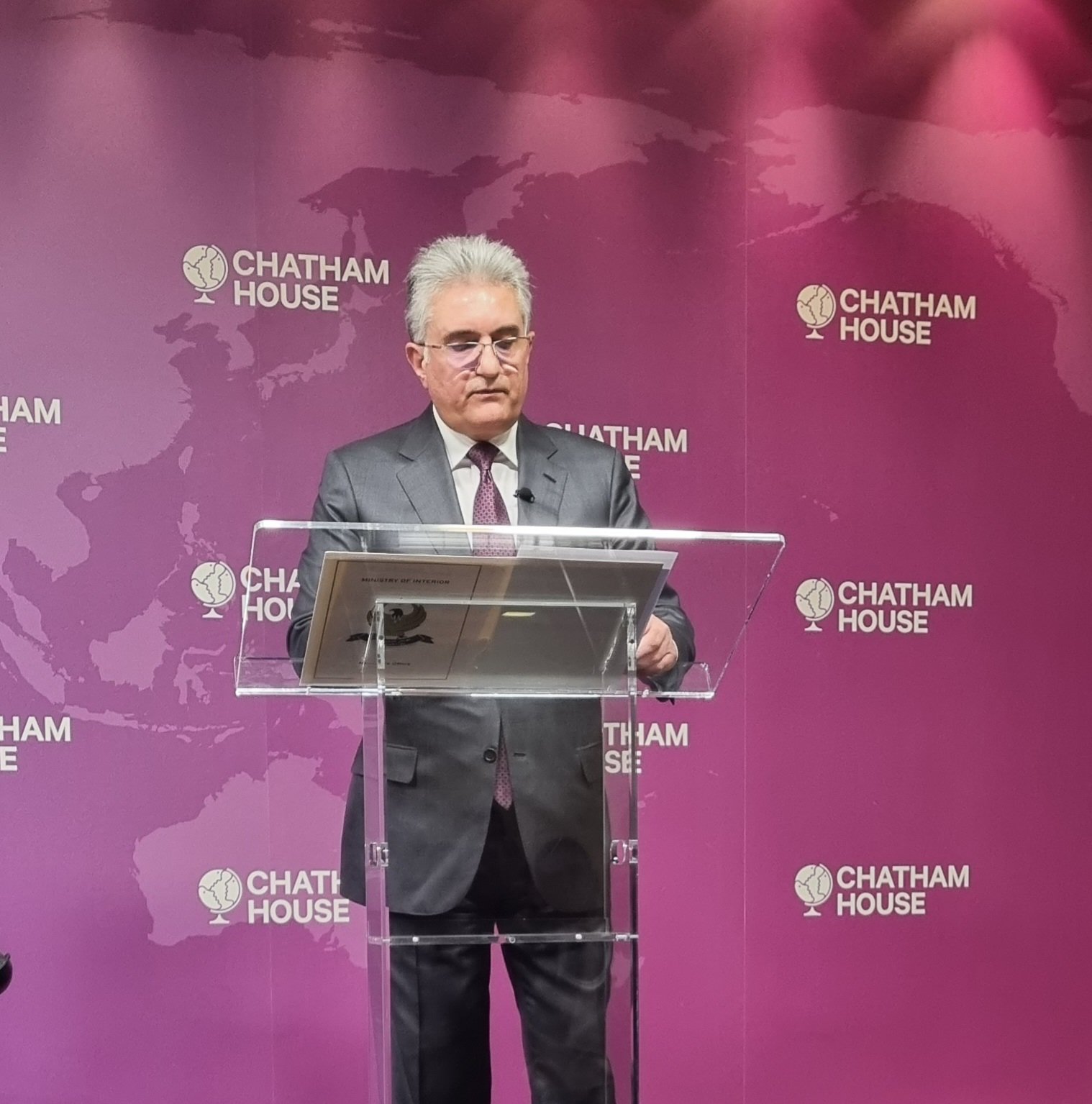Kurdistan Regional Government Interior Minister addresses the "Iraq Initiative" conference at Chatham House.
 News : 11/8/2023
News : 11/8/2023
United Kingdom, London, Chatham House, www.uk.gov.krd. On Wednesday 8th November, Chatham House hosted the annual Iraq Initiative Conference. This was
an opportunity for academics, diplomats, politicians, and other stakeholders
openly discuss matters concerning Iraq and Kurdistan Region. The conference
covered a wide range of issues affecting the region, from security to climate.
During the first session of the conference, H.E. Rebar Ahmed Khalid, KRG Minister of Interior had the
opportunity to give a speech outlining the current perspective of the Kurdistan
Region in Iraq.
You can read his speech below:
“I am pleased to join you today for this
year's Iraq Initiative Conference. Before I share my perspective, I would like
to extend my gratitude to Chatham House for inviting me to speak.
“For over a century, Chatham House has
been playing a great role in promoting open discussions on foreign policy
questions far beyond the United Kingdom. It is through open dialogue that we
can collectively address the complex challenges of state-building and
governance in Iraq and beyond.
“Our presence here today acknowledges that
there are issues that need attention, emphasizing our shared commitment to
shaping a future that caters to the diverse groups in Iraq.
“That is what I hope we can do today; to
debate our problems as openly as I can and debate matters that have often been
told behind closed doors.

“We meet at a time of great uncertainty in
the Middle East. In April last year, Prime Minister H.E. Masrour Barzani spoke
from this very podium, warning that the Middle East remains an unpredictable
driver of world events with a proven potential to be a mass global disruptor.
Recent events in the Middle East remind us of the consequences of turning away
from the Middle East and not addressing the root causes, but focusing on
treating the symptoms instead in a bid to silence what has often been unpopular
to discuss publicly.
“Iraq has not been spared from this
challenges. Since the overthrow of the dictatorship more than twenty years ago,
Iraq’s progress to a federal system remains largely incomplete.
“Constitutional safeguards designed to
prevent the tragedies of the past and the insecurities of the future for Kurds,
Sunnis and Shia have been openly challenged. Some of these provisions have been
entirely reversed, threatening the power-sharing configuration with the KRG,
and undermining the constitution all the parties voluntarily embraced in 2005.
“There is still important work left to be
done to fully transition from Iraq’s long history of centralization to a
fully-fledged federal system. Progress on land disputes, with supervision from
the United Nations, would signal good-will to Kurdish families who continue to
be expelled from their ancestral lands in Kirkuk.
“The establishment of a second chamber, or
federation council, would anchor a federal system. And a revenue-sharing law
that gives each group a stake in their future would bring about trust in ways
that are currently missing.
“This cycle of distrust deserves a closer
look. We in the Kurdistan Region have been patient, but our duties have not translated
into meaningful rights; agreements meant to give us a monthly share of the
federal budget have been repeatedly violated, robbing us of basic citizen
rights.
“This should not be allowed to continue. As
I stand here today, twenty years after the removal of the former regime, I can't
help but feel that our people deserve better, as do all Iraqis.
“We all aspired to a federal system where
everyone, regardless of ethnic or religious background, would enjoy
irreversible rights, economic benefits and individual security, all under a
federal umbrella.
“That hasn’t happened. At times, it has
seemed like every group has had to fend for itself to secure its future,
relying on the good-will of individual politicians in Baghdad or, even worse,
neighbouring countries.
“This has hampered progress aimed at
enhancing Iraq's security. This has been made clear, with what has now become
almost routine drone attacks into the Kurdistan Region. This has jeopardized
the post-ISIS recovery too, threatening to trigger a new wave of displaced
families.
“The Yazidis’ issue remains unsolved. The
Sinjar agreement, signed more than three years ago, remains abstract. Armed
groups, militias and the PKK, continue to occupy the area; a local government
has yet to be elected; and the Yazidi people, who have waited far too long to
return to their ancestral homeland, continue to long for a future where they
can live in safety and dignity; a future they can shape on their own terms.
“It is easy to say that the odds are
against Iraq, but we in the Kurdistan Region still believe that real progress
can be achieved if we acknowledge that the starting point should not be a
debate over an outright return to the pre-federal Iraq or an end of
constitutional protections; it must instead be about building upon what has
been achieved.
“That is why we are here today; to be
humble about the failures since 2005, openly discuss what could change, and
determine the best way to do it. I can’t think of any other institution than
Chatham House that can credibly provide a better forum for debating these
questions and ideas.
“I look forward to taking part in what I’m
confident will be a fruitful debate over the next couple of hours.
Thank you.
8th November 2023